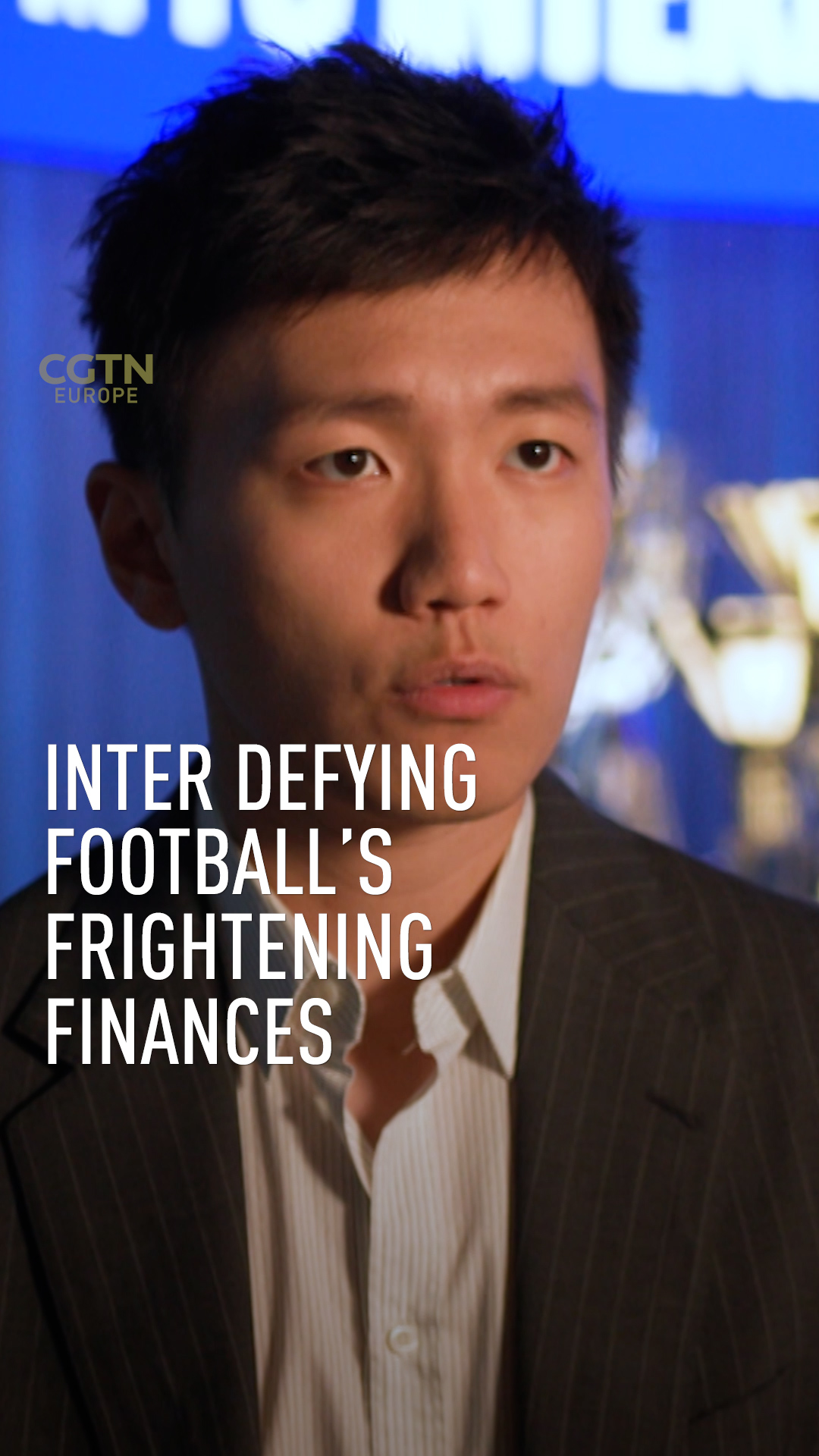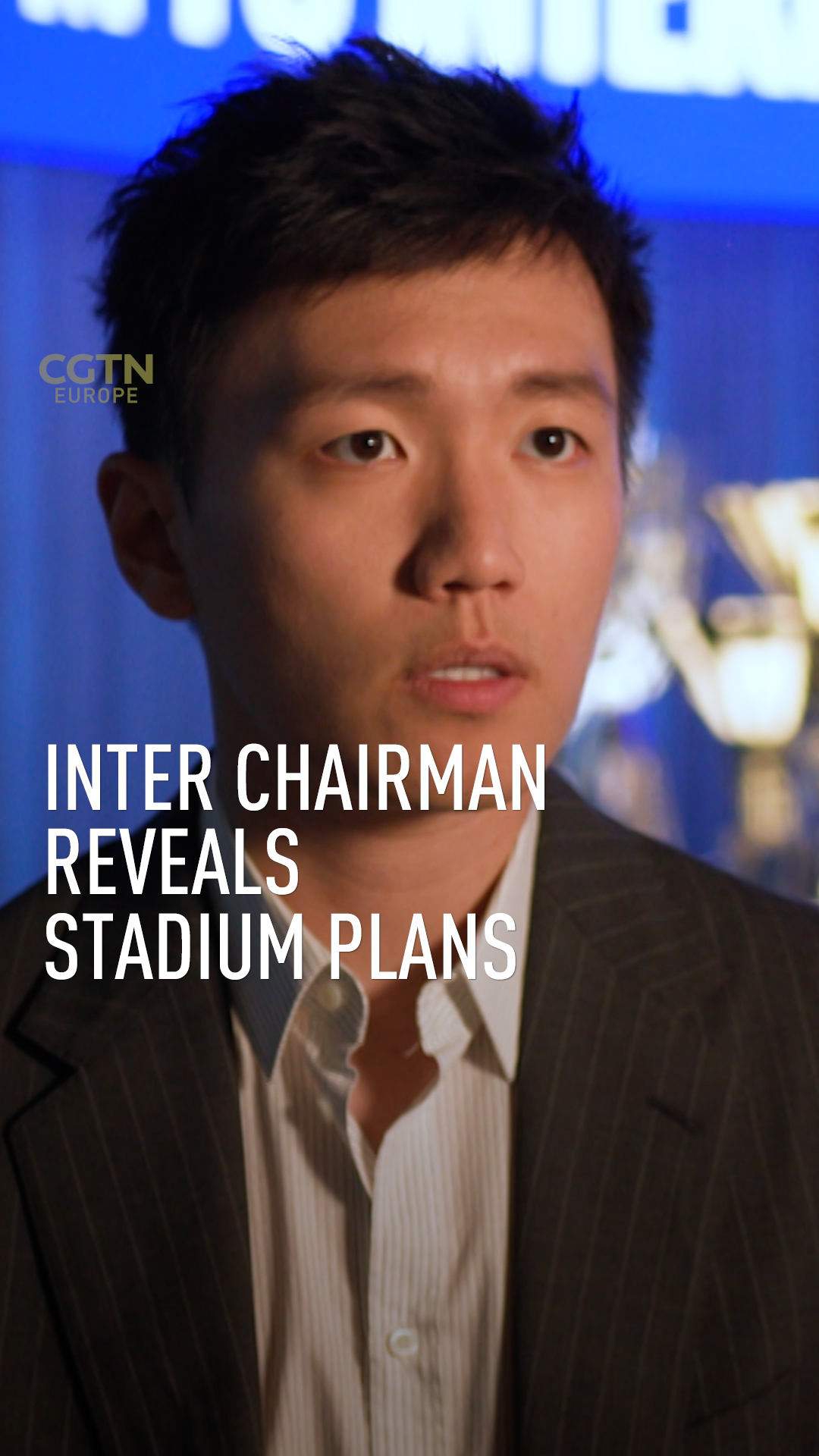01:57

Inter Milan is a proud old football club. Dating back 115 years, it has collected 35 domestic trophies (including 19 league titles), six continental trophies including three European Cup/Champions League titles, and three global trophies.
Even so, it's not every day you play a Champions League final – but that's the level that Inter reach on Saturday, when they face English champions Manchester City for the winner-takes-all match in Istanbul.
Amid the hectic preparations, the club's chairman/owner Steven Zhang took the time to sit down with CGTN Europe and reflect on his own amazing seven-year journey with one of football's greatest names.
Inter was in the doldrums when China's Suning Holdings Group acquired the club in summer 2016. Zhang held a boardroom position and, in October 2018, became club chairman at just 26 years old – Inter's youngest-ever chairman.
The following season, Inter finished second in the league; in 2021, they won the league; and last season, they won two trophies - the national Coppa Italia and the Supercoppa Italiana. Both cups were retained this season, while Inter forged into the Champions League final. So how does it feel to be in one of sport's biggest events?
"Since we bought the club, this is one of our missions, one of our goals – to arrive on top of Europe and top of the world," Zhang tells CGTN. "Because Inter was always participating at the best level of the sports industry and winning so many trophies."
At this point he slightly corrects himself, mindful of Inter's underachievement before Suning's 2016 arrival as owners – the club had gone half a decade without winning a trophy.
"Before we bought the club, Inter was not at that level. In the past seven years we continued improving and every season you see our performance improve a bit. Finally we're here and winning five trophies in the past three years, participating in the Champions League for five times in a row and eventually reaching the final of the Champions League, I'm very proud to say that finally we have done our job and the club is at the high level."
01:13

Success and cost
Indeed, that five-trophy run has elevated Zhang into exalted company, making him already the third-most successful chairman in Inter's history, behind the legendary Angelo Moratti – under whom the club won two European Cups in the 1960s – and his son Massimo Morratti, who between 1995 and 2013 is said to have plowed $1.2bn of his own money into the club.
With football's spiraling expense supercharged by television income and the enormous petrodollar power of state-backed sides like Paris St Germain and Manchester City, such personal largesse is now rare. Zhang is well aware of the spending gap between his club and some of its gilded rivals. But how can that gap be bridged?
"It has to be done on an individual level as a football club, but also on a league level," he says. "As an Italian football team, our top team's TV revenue is less than a team in the Premier League relegation zone – so there's a big gap.
"So for Inter, we have to be innovative on social media, digital creation, digital content, fan engagements and the services we provide to our sponsors. But at the same time, we have to push our league to be innovative, improving our TV quality, improving our stadium quality."

Zhang and coach Simone Inzaghi with the trophy after Inter retained the Coppa Italia. /Daniele Mascolo/Reuters
Zhang and coach Simone Inzaghi with the trophy after Inter retained the Coppa Italia. /Daniele Mascolo/Reuters
Zhang is realistic about the potentially stratospheric cost of football club ownership: "As a shareholder we put a lot of resource into the club, but with [rivals spending] 10 or 100 times more resource, the gap between some other leagues is too big."
That leaves Inter treating every transfer window as a trading opportunity, balancing strengthening the team with bargain-hunting and maximizing potential future profit on saleable assets.
"Similar to almost all clubs, we have our balance sheet to be taken care of – we have to balance our passion and logic, we have to take in consideration the financial security of the club, the stability of the company," he says.
"Every single transfer market is an opportunity for us to invest into the club of the players to improve, but at the same time to make the right choices in order to take the opportunity to see what kind of resources that the market can give us in order to invest for the future.
"As the owner of the club, our first objective is to think about winning. At the same time, we cannot ignore the importance of the balance of the club, the sustainability of the club for the future."
New stadium
That leads on to a topic Zhang already touched on: stadium quality. Since 1947, Inter has shared with city rivals AC Milan the San Siro stadium; it's one of football's most famous arenas, but it's well past its best – it hasn't been renovated since Italy hosted the 1990 World Cup.
Furthermore, the clubs are tenants, which means they don't receive anything like the hospitality income that supercharges their European rivals. Just 3 percent of the San Siro seats are in hospitality areas; by contrast, at Tottenham Hotspur's benchmark new $1 billion stadium, 20 percent are corporate.
Both clubs have long discussed leaving the stadium to start anew – a painful decision for the romantics among the fans, but an entirely pragmatic one in football's new financial landscape.

The San Siro is instantly recognizable – but far from lurcative. /Alessandro Garofalo /Reuters
The San Siro is instantly recognizable – but far from lurcative. /Alessandro Garofalo /Reuters
"For the past seven years, our idea is always consistent," says Zhang, "to have a new stadium providing a new experience for our fans, in order to improve the commercial value and ability of the club, and in order to make sure the club can always compete at the top level with the support of the new stadium."
Different new-stadium plans have come and gone – and so have different ownership groups at AC Milan, which has complicated discussions as to whether or not the clubs should move to a shared stadium or separate homes. Zhang's preference is to work together.
"Our idea has not changed – that it's important for us to work with AC Milan. But in the past seven years, the other side of the city changed the owner a lot of times, and every time we have a different idea."
Improvement
While some fans might long for their local rivals to fail, Zhang would be glad to see AC Milan – whom Inter beat in the Champions League semi-final – push them close at football's top table.
"When the two clubs are competing at the top level is the best for the city – and also the clubs are pushing each other eventually to improve each other," he says. "It's like you have a brother or cousin who is always pushing you to improve."
Improvement has been the story for Inter under Zhang – and whether or not that includes beating Manchester City, he's loved the journey.
"First of all, we're really proud that as a foreign owner coming to this country, first to win a league title, first to participate in such a high-level competition and then reach the final as a Chinese investor. It's historic and nobody probably expected.
"The final is just one game, winning or losing is part of sports. But arriving there already gave us a lot of satisfaction and we are really happy for all the staff and employees, and we would like to share this joy and this moment with everybody who has worked until today to achieve this goal."
Interview: Alex Fraser

Subscribe to Storyboard: A weekly newsletter bringing you the best of CGTN every Friday